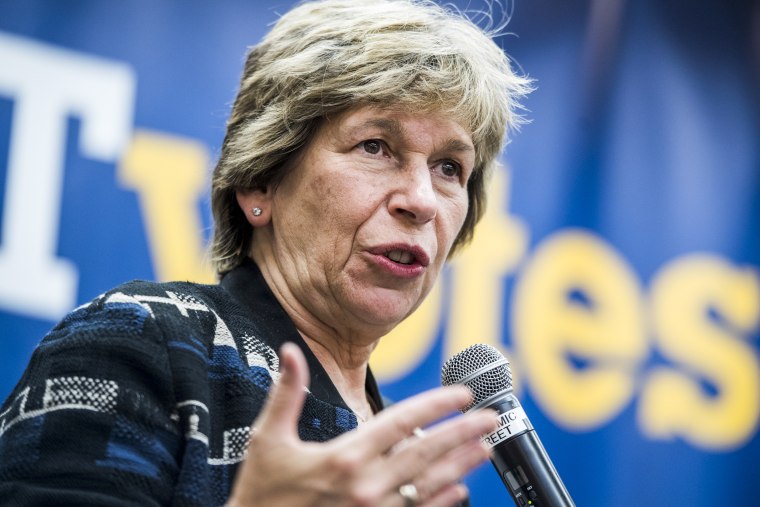WASHINGTON — Democrats should stop hiding and start fighting Republicans on hot-button education issues like battles over teaching racial issues in school, according to polling at the heart of a new push by the American Federation of Teachers ahead of the midterm elections.
The survey, conducted by Hart Research in seven battleground states in May and provided first to NBC News, found Republicans had a 39% to 38% advantage on which party voters trust more on education.
“We need to get out of our crouch here,” said Guy Molyneux, a pollster at the Democratic firm who worked on the survey.
Read the poll and the polling memo.
In recent years, Democrats — and their teacher-union allies — have found themselves on the defensive against Republican efforts to ban books and lessons on race and gender identity. School boards have been torn asunder over "critical race theory," and conservatives have portrayed teachers and Democrats as child predators. That has left many Democrats nervous about engaging on cultural issues attached to schooling, particularly since former Virginia Gov. Terry McAuliffe lost his comeback bid after saying parents should not have a hand in curriculum decisions.
But the Democratic pollsters who went into the field for the American Federation of Teachers concluded that most voters want their kids taught the good and the bad about race relations in America — less so about gender identity — and may reward the party that focuses more on fundamental instruction than ideological warfare.
“You need to deal with it and show that most of what they’re saying about teachers or about schools or about Democrats is not true," Molyneux said. "But then you want to turn to areas that are more important” such as funding and fundamental instruction.
That explains the two-step thrust-and-parry messaging American Federation of Teachers President Randi Weingarten will outline Thursday morning during her union's convention in Boston.
"While extremist politicians are trying to drive a wedge between parents and teachers by banning books, censoring curriculum and politicizing public education, we’re focused on investing in public schools and the essential knowledge and skills students need," Weingarten plans to say, according to an advance copy of her remarks provided to NBC News by the union.
"We’re focused on accelerating learning, not just catching up. We are fighting for the conditions and the climate students need to thrive like state-of-the-art buildings, with good ventilation, lower class sizes and mental health resources," she plans to say.
Evident in the polling and messaging efforts is a concession that Democrats have lost their edge on education and need to execute an aggressive and sophisticated plan to get it back.
In a memo accompanying the survey, pollsters Molyneux, Geoff Garin and Alicia Williams identify a four-part communications strategy: frame Republicans as politicizing education; emphasize Democrats' preference for investing in schools; highlight the most extreme proposals from conservatives; and reinforce the idea that parents have an important role in ensuring their kids get a good education.
That last part is a clear nod to McAuliffe's major misstep — one important enough that the pollsters added Democrats should identify "Republican politicians, not parents, as the threat to public education."
The survey found that 60% of voters in states with competitive Senate races this year are dissatisfied with the way racial issues are taught in schools. A 33% plurality said that is because it is important to teach history, with an additional 19% saying that more should be taught about race. Another 20% said they felt that way because of distortions in lessons, and 18% said they were dissatisfied because teaching about racial issues continues to divide society.
On the topic of sexual preference and gender identity, 58% of the same voters said they are dissatisfied with the way the issues are discussed in schools. A 31% plurality, including 12% of self-described liberals, said students are too young for the material. At a close second, 27% said parents should be responsible for teaching those subjects to their children. Just 11% of respondents said there is not enough teaching about sexuality and gender.
The states included in the poll were Arizona, Florida, Georgia, Michigan, Nevada, Pennsylvania and Wisconsin.

